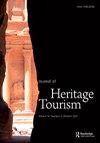Authenticity and tourism development: the simple problem of incense at Cham living heritage sites in Vietnam
IF 2.2
Q2 HOSPITALITY, LEISURE, SPORT & TOURISM
引用次数: 0
Abstract
ABSTRACT This article details the perception of indigenous Cham communities in the Socialist Republic of Vietnam (SRV) with regard to the concept of authenticity. Based upon a combination of historical and anthropological methods, including interviews conducted in the Cham and Vietnamese language, and participant observation, between 2012 and 2017, we found government officials have imposed their own concept of authenticity on indigenous heritage sites, favouring tourist development. This includes the apparently mundane use of joss-stick incense. Consequentially, members of the Cham community are distraught. Incensed over incense, in a sense, they contend this is a violation of their customary practices and therefore inauthentic. Hence, we argue that if indigenous culture is over commodified, without respect for what may appear to be simple regulations, tensions will emerge, creating the perception from within the community that outside forces are collaborating to lead to the destruction of the indigenous heritage site. An alternative approach is to view the concepts of living heritage as foundational in cases where indigenous heritage is promoted for the sake of tourists. This alternative approach would lead to a decrease in potential tensions, while balancing needs of the community and tourist industry.真实性与旅游发展:越南占族活遗产地香的简单问题
摘要本文详细介绍了越南社会主义共和国(SRV)土著Cham社区对真实性概念的看法。基于历史和人类学方法的结合,包括在2012年至2017年间用湛语和越南语进行的采访,以及参与者的观察,我们发现政府官员在土著遗产地上强加了自己的真实性概念,有利于旅游业的发展。这包括明显平凡的使用香。因此,湛社区的成员悲痛欲绝。从某种意义上说,他们认为这违反了他们的习惯做法,因此是不真实的。因此,我们认为,如果土著文化过度商品化,不尊重看似简单的法规,就会出现紧张局势,在社区内部造成一种看法,即外部势力正在合作,导致土著遗产地遭到破坏。另一种方法是,在为游客宣传土著遗产的情况下,将活遗产的概念视为基础。这种替代方法将减少潜在的紧张局势,同时平衡社区和旅游业的需求。
本文章由计算机程序翻译,如有差异,请以英文原文为准。
求助全文
约1分钟内获得全文
求助全文
来源期刊

Journal of Heritage Tourism
HOSPITALITY, LEISURE, SPORT & TOURISM-
CiteScore
6.50
自引率
11.10%
发文量
39
期刊介绍:
The Journal of Heritage Tourism ( JHT ) is a peer-reviewed, international transdisciplinary journal. JHT focuses on exploring the many facets of one of the most notable and widespread types of tourism. Heritage tourism is among the very oldest forms of travel. Activities such as visits to sites of historical importance, including built environments and urban areas, rural and agricultural landscapes, natural regions, locations where historic events occurred and places where interesting and significant living cultures dominate are all forms of heritage tourism. As such, this form of tourism dominates the industry in many parts of the world and involves millions of people. During the past 20 years, the study of tourism has become highly fragmented and specialised into various theme areas, or concentrations. Within this context, heritage tourism is one of the most commonly investigated forms of tourism, and hundreds of scholars and industry workers are involved in researching its dynamics and concepts. This academic attention has resulted in the publication of hundreds of refereed articles in various scholarly media, yet, until now there has been no journal devoted specifically to heritage tourism; Journal of Heritage Tourism was launched to fill this gap. JHT seeks to critically examine all aspects of heritage tourism. Some of the topics to be explored within the context of heritage tourism will include colonial heritage, commodification, interpretation, urban renewal, religious tourism, genealogy, patriotism, nostalgia, folklore, power, funding, contested heritage, historic sites, identity, industrial heritage, marketing, conservation, ethnicity, education and indigenous heritage.
 求助内容:
求助内容: 应助结果提醒方式:
应助结果提醒方式:


